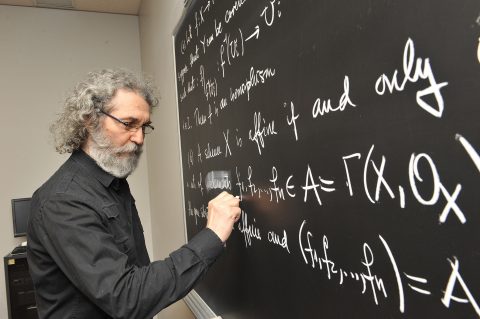Statistics (BA, BSc)
Why study Statistics?
Statistics is the science of information that lets you discover patterns behind data. As a statistician, your understanding of probability theory lets you make decisions in the face of uncertainty. Statisticians also conduct surveys, analyze data, devise new methods of analysis and give advice on the statistical results of experiments such as clinical trials. Though it’s impossible to predict the future with 100 per cent accuracy, studying statistics will teach you creative problem solving, abstract thinking and analytical skills.
When you study statistics, you learn to uncover the mathematical structure of random systems such as the economy, health and survival, the weather, and the stock market. You will also receive a solid foundation in linear algebra, calculus, probability and computational methods and learn to use professional software tools for mathematics and data analysis applications.
An undergraduate degree in statistics prepares students for graduate work in statistics or in a professional career in business, industry, medical research or government agencies.
Special funding for out-of-province students
Up to $4000 for undergraduate programs.
Program structure
A Bachelor of Arts or Science degree takes a minimum of three or four years (90 – 120 credits) of full-time study, depending on your academic background.
Program options
- Honours in Statistics (66 credits)*
- Specialization in Statistics (60 credits)
*Admission is to the Specialization. Students in the specialization program seeking admission to the honours program may apply to the departmental honours advisor – normally following the completion of 30 credits.
Courses
Co-op program
The Co-op program gives you the chance to complete paid work terms that last 12 to 16 weeks. As a Co-op student, you will work for firms where you may:
- Update industry and market statistics
- Plan experiments
- Perform data analysis
- Develop databases
- Manipulate algorithms
- Test survey hypotheses
United States students: A U.S. Federal Student Aid-eligible version of this program is offered. This version meets all U.S. regulations (such as no co-operative education or e-courses) for eligible programs.
Admission criteria
Minimum cut-off averages and course requirements
- Quebec CEGEP: 24 overall, 24 math and science
- Admission is based on the CRC requirements indicated above and completion of the following classes as part of their DEC: Calculus 1, Calculus 2, Linear Algebra; Mechanics, Electricity and Magnetism and Wave, Optics and Modern Physics; General Chemistry and Chemistry of Solutions; General Biology (OR Cellular Biology AND Ecology and Evolution)
- Additional information for CEGEP applicants
- High School: B- overall, B- math and science
- Canadian curricula course requirements
- Accepted international qualifications
- One math from Pre-Calculus, Calculus, or equivalent
- Two sciences (from Biology, Chemistry or Physics)
- ACT or SAT is not required
- AP exams are not required but may qualify you for advanced standing
- International Baccalaureate (IB) diploma: 27 overall, 4 math and science
- one math (Applications and Interpretations HL, Analysis and Approaches HL or Analysis and Approaches SL)
- one science (Physics, Chemistry or Biology, either SL or HL)
- one of the math or science courses must be completed at the HL level
- International Baccalaureate Career-related Programme (CP): 4.5/7 overall, 4 math and science
- one math (Applications and Interpretations HL, Analysis and Approaches HL or Analysis and Approaches SL)
- one science (Physics, Chemistry or Biology, either SL or HL)
- one of the math or science courses must be completed at the HL level
- Additional Career-related Programme (CP) course requirements
- Baccalauréat français: 12 overall, 12 math and science
- Première: Spécialité mathématiques and Spécialité physique-chimie
- Terminale: Spécialité mathématiques (also accepted, Spécialité Physique-Chimie and Mathématiques Complémentaires)
- Additional information for Baccalauréat français applicants
- British system of education (GCE):
- A-levels: At least two A-level exams CD, C in math, C in science or
- AS-levels: At least 4 AS-level exams with equivalent results or
- BTEC: Level 3 Diploma or Extended Diploma in a related subject area with equivalent results
- Students without math or science A-levels may be admissible based on AS-level or iGCSE/GCSE/O-Level exam results. Students should include all their exam results from iGCSE (or equivalent) onwards to support their application.
- Additional information for British System of Education (GCE) applicants
- University Transfers (internal/external): C+ overall, C+ math and science
- Courses in the disciplines of Calculus, Linear Algebra, Biology, Chemistry and Physics
Minimum cut-off averages should be used as indicators. The cut-off data may change depending on the applicant pool. Applicants who meet the stated minimum requirements are not guaranteed admission to these programs.
Minimum cut-off averages and course requirements
- Quebec CEGEP: 24 overall, 24 math
- Linear Algebra; Calculus 1 & 2
- Additional information for CEGEP applicants
- High School: B- overall, B- math
- Canadian curricula course requirements
- Accepted international qualifications
- One math from Pre-Calculus, Calculus, or equivalent
- ACT or SAT is not required
- AP exams are not required but may you qualify for advanced standing
- International Baccalaureate (IB) diploma: 27 overall, 4 math
- one math (Applications and Interpretations HL, Analysis and Approaches HL or Analysis and Approaches SL)
- International Baccalaureate Career-related Programme (CP): 4.5/7 overall, 4 math
- one math (Applications and Interpretations HL, Analysis and Approaches HL or Analysis and Approaches SL)
- Additional Career-related Programme (CP) course requirements
- Baccalauréat français: 12 overall, 12 math
- Première: Spécialité mathématiques
- Additional information for Baccalauréat français applicants
- British system of education (GCE):
- A-levels: At least two A-level exams CD, C in math or
- AS-levels: At least 4 AS-level exams with equivalent results or
- BTEC: Level 3 Diploma or Extended Diploma in a related subject area with equivalent results
- Students without a math A-level may be admissible based on AS-level or iGCSE/GCSE/O-Level exam results. Students should include all their exam results from iGCSE (or equivalent) onwards to support their application.
- Additional information for British System of Education (GCE) applicants
- University Transfers (internal/external): C+ overall, C+ math
- Courses in the disciplines of Calculus and Linear Algebra
Minimum cut-off averages should be used as indicators. The cut-off data may change depending on the applicant pool. Applicants who meet the stated minimum requirements are not guaranteed admission to these programs.
Application deadlines
It’s not too late to apply
Most undergraduate programs are still accepting applications for fall 2026.

FALL ENTRY (September)
Deadline: March 1
U.S. and international applicants: Apply no later than February 1 to allow time for immigration document processing. However, applying earlier is strongly recommended. Immigration processing times vary by country and delays could prevent you from starting your studies on time.

WINTER ENTRY (January)
Deadline: November 1
U.S. and international applicants: Apply no later than August 1 to allow time for immigration document processing. However, applying earlier is strongly recommended. Immigration processing times vary by country and delays could prevent you from starting your studies on time.
We reserve the right to close admission to a program at any time after the official deadline without prior notice.
Student story

Kyle McRae
Honours in Statistics
Minor in Computer Science
Statistics allowed Kyle McRae to explore different communities and opportunities for his career at Concordia.
Other programs of interest

If you want to learn how to predict the future, consider actuarial mathematics. Actuaries use their mathematical and statistical wizardry to solve problems involving risk and uncertainty.
Department
Department of Mathematics & Statistics
Faculty

Mathematics is a universal language that explains the currents of the ocean, string theory, the spiral of a snail’s shell or the growth of a fern.
Department
Department of Mathematics & Statistics
Faculty

Mathematics is a language that answers real-world questions in science and engineering. Statistics is the science of information.
Department
Department of Mathematics & Statistics
Faculty

